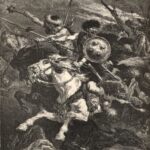According to Edward Gibbon (1737-1794), author of the classic work The Decline of the Roman Empire, the greatest influence on the disintegration of the Roman Empire was, among others, Christianity, the loss of civic values by the Romans, or “the great migration of peoples”.
The historian emphasized that the invasion of barbarian tribes from the 3rd century CE had a large impact on the fall of Rome. Moreover, the military weakness of the legions was greatly influenced by the moral decline and loss of civic virtue among the Romans.
During the second century of the Christian era, the Roman Empire embraced the most beautiful parts of the world and the most civilized part of humanity… the fire of genius died out and even the military spirit evaporated… internal discord and raids by the fiercest barbarians from the unknown northern regions. .. all this was but a preparation, alarming signs of the approaching great catastrophe of Rome.
…the volatility of fortune, which spares neither man nor the proudest of his works… burying empires and cities in a common grave.– Edward Gibbon, The History of the Decline and Fall of the Roman Empire
Another important reason for the fall of Rome was supposed to be the uprising of the Praetorian Guard under Octavian August and its influence on power central later.
Edward Gibbon drew attention to the negative influence of Christianity on all aspects of the Empire, especially the military. According to the Christian faith, a better life awaited after death, and what’s more, the apostles advocated pacifism, which was contrary to the militant attitude of the Romans. Moreover, the followers of Christ were divided, which meant that Roman society was no longer united.
The various creeds and forms of worship existing in Rome were considered equally true by common people, equally false by philosophers, and equally useful by officials.
– Edward Gibbon, The History of the Decline and Fall of the Roman Empire
Many later historians – with the development of research and subsequent archaeological discoveries – began to criticize Gibbon’s arguments and “simplification”. Among others, John Bagnell Bury (1861-1927) – criticized Gibbon for his vision of seeing the cause of the fall of Rome in the spreading of Christianity. As the Eastern Empire notes, it was strongly Christian, and it survived for many centuries. In addition, he believes that Gibbon’s approach is too one-causal and incomplete. Bury argues that the fall of Rome resulted from a series of complex events, which precludes listing general causes. Rome was troubled by many crises that appeared at the same time: economic decline, the invasion of the Germans, the depopulation of Italy, the dependence of the armies on the German foederati, the betrayal of Stilicho, the loss of the will to fight, the death of Flavius Aetius or the lack of a leader worthy of Aetius. It was a series of unfortunate coincidences and circumstances that led to a great catastrophe.
It should be emphasized, however, that it was Edward Gibbon who initiated the interest of historians at the end of the Roman Empire and the “migration of peoples”.






